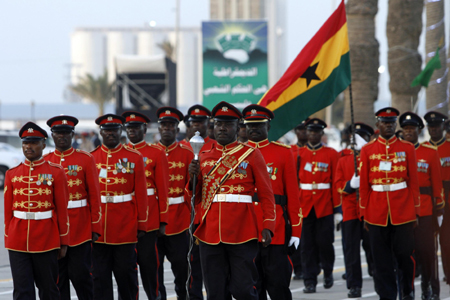A week long of celebrations sweep through Libya in one of Africa's biggest ever event to mark the 40th anniversary of the Libyan revolution, which brought leader Muammar Ghaddafi into power.

|
|
Honour guards march during a military parade in Tripoli, capital of Libya, on Sept. 1, 2009 to mark the 40th anniversary of Libyan Revolution, which brought leader Muammar Ghaddafi to power in 1969.[Hamza Turkia/Xinhua]
|
The anniversary celebrations were in conjunction with a special summit of African Union (AU) leaders summoned by Ghaddafi, one of the longest-serving leaders in the world, to seek solutions to regional conflicts.
Analysts said what behind the coincidence is Ghaddafi's intention to boost not only his domestic reputation, but also Libya's political clout on the African continent and in the international community as well.
Ghaddafi's political weight
On Sept. 1, 1969, Ghaddafi and his Free Officers Movement, a group of revolutionary army officers formed in 1963, overthrew King Mohammed Idriss.
This year, Ghaddafi invited dozens of heads of state and government to commemorate his 40-year rule in the third largest oil producer in Africa after Nigeria and Angola.
Guests present at the national gala included Venezuelan President Hugo Chavez, Philippine President Gloria Macapagal Arroyo, her Palestinian counterpart Mahmoud Abbas and African leaders who had attended the special summit in Tripoli.
Though Italian Prime Minister Silvio Berlusconi stayed away from the grand event, he visited Libya on Sunday to commemorate the first anniversary of a friendship treaty between the two countries.
Many believed the week-long and spectacular ever celebrations are designed to send the message to the world that Libya is open and friendly and showcase its acceptance on the world arena.
Since the mid-1980s, Libya has been subject to upgrading sanctions by the United States and the European Union (EU) over its alleged terror links.
After a plane exploded in 1988 over Lockerbie, Scotland, the relationship between Libya and the West hit the bottom as the Western countries accused Tripoli of being behind the bombing.
In recent years, the North African country's international relations have been dramatically improved as it agreed to accept responsibility for the Lockerbie bombing and declared it would abandon its weapons of mass destruction programs in 2003.
In 2006, Libya re-established diplomatic relations with the United States, entering a new era of ties with the West.
On Aug. 20 this year, the convicted Lockerbie bomber Abdelbaset Ali Mohmed al-Megrahi was released by Scottish officials on compassionate grounds due to his cancer, signalling an end to the decades-old diplomatic knot.
Although his "hero's welcome" in Tripoli was denounced by Washington and London, analysts said British and U.S. geopolitical interests in the energy-opulent country were behind the final decision to set al-Megrahi free.
Of equal significance to Ghaddafi is that Libya received an apology on Aug. 20 from the Swiss President Hans-Rudolf Merz over the arrest in Geneva of Ghaddafi's son a year ago.